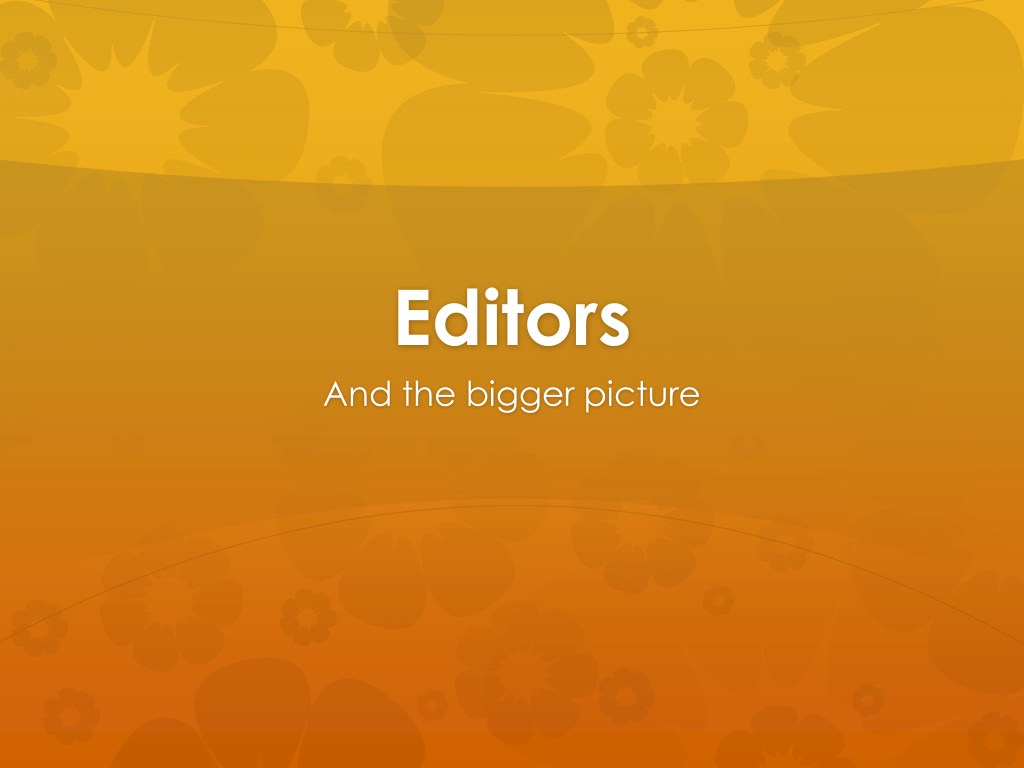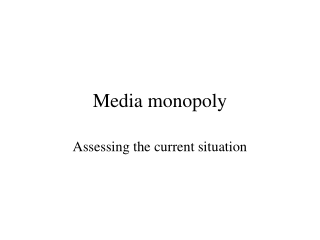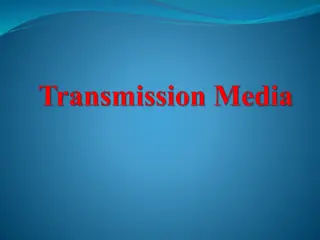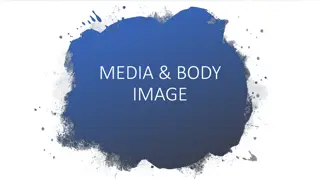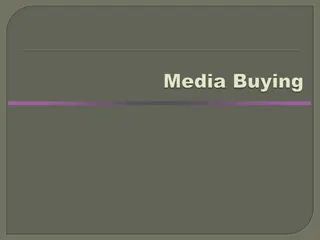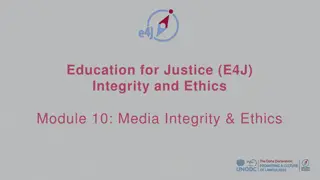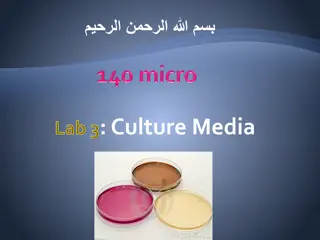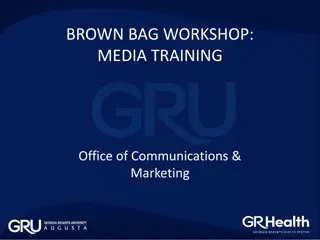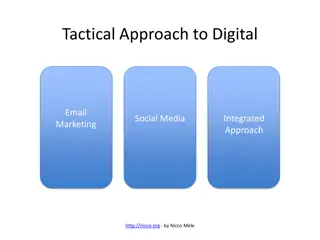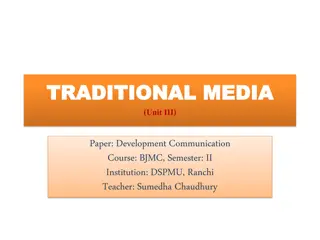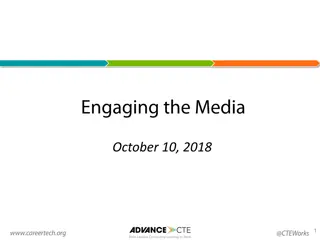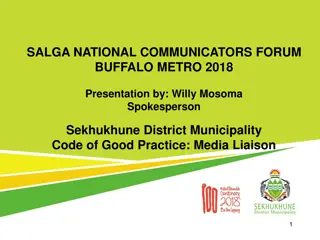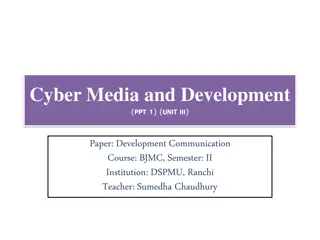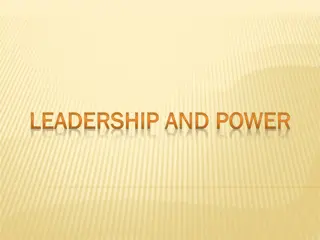Understanding the Power of Published Words in Media
Media professionals often underestimate the influence words published hold over credibility, permanency, and authority. Readers tend to trust published statements without verifying sources, assuming credibility. Ethical responsibility lies in distinguishing among facts, interpretations, and judgments in media content.
Download Presentation

Please find below an Image/Link to download the presentation.
The content on the website is provided AS IS for your information and personal use only. It may not be sold, licensed, or shared on other websites without obtaining consent from the author. Download presentation by click this link. If you encounter any issues during the download, it is possible that the publisher has removed the file from their server.
E N D
Presentation Transcript
Editors And the bigger picture
Words have power Mass media professionals sometimes don t realize the power of published words. Words give us credibility and permanency. People believe because it was published in a book.
Publications People tend to presume a statement must be valid because it was published somewhere, even if they don t remember where. When students or scholars do research, they presume that adding a reference automatically gives credibility: According to recent research, the sun revolves around the earth (Nern, 2014).
References Most people don t bother to look up references, but take their credibility for granted. But if you looked up the Nern reference, you might find it is from the Journal of the Flat Earth Society.
Credibility Is that reference credible? You can decide, but the point is that publication gives statements more authority no matter where they are published. Maybe we think we re skeptical of published material. But often we re not.
Skeptical readers An article in a French publication quoted a supposed skeptic ridiculing another s opinion by saying, That s just one of those ridiculous things you read in the newspaper! A few statements later, he said of his own opinion, Oh, I know it s true. I read it in the newspaper. I think nowadays we could sometimes say the same thing regarding online publication.
Responsibility Ethical media professionals have a responsibility to carefully consider what they are publishing. We can begin by learning to identify three kinds of statements: Facts. Interpretations. Judgments.
Facts A fact is a verifiably true statement made by a writer or by someone quoted that is, a source. By the writer: The weather yesterday was bright and sunny in Fargo. This is an easily verifiable fact.
Facts By someone else, quoted: It was a bright and sunny day yesterday on Minnesota s Big Detroit Lake, according to mayor Sandy Bietsch. The reporter may not have been there, but it s still verifiable by consulting weather reports or asking other people who were there.
Facts How about this? It will be sunny tomorrow, according to chief meteorologist Erv N. Nern. It s verifiable in that the writer could probably prove Nern said it. It s not verifiable in that tomorrow hasn t arrived. But it soon will be verifiable.
Facts We rely on the facts of the sentence above by examining the credibility of the source. In this case, we can presume a meteorologist would make a prediction based on scientific methods of analysis proven to be generally accurate.
Facts How about this, then? It will be sunny tomorrow, according to Ross Collins, professor of communication. Fact? Here we have to question the credibility of the source. One thing is certain: it soon will be easy to verify.
Facts and sources Facts attributed to a source who is quoted or paraphrased: this is the most common way of presenting information in the mass media. But these statements depend not only on an objective ability to verify, but also on the credibility of the source.
Facts and sources This means if a media writer says something published is a fact because the source was quoted accurately, she or he is missing the point. Readers presume the quote is accurate. But they still need to know if the fact that was asserted by the source is accurate. Nowadays many of us believe ethical journalists have some responsibility to evaluate facts proposed by sources.
Verification That means most often that journalists should try to verify the fact. Most often facts are easy to verify. Note: fact checkers who go through stories on large publications will verify facts by making sure the source is correctly quoted. They will not necessarily verify that the material in the quote is correct.
Interpretations Interpretations are comments based on facts. Often these are made by the writer following a quote from a source. It was bright and sunny yesterday, said Detroit Lakes mayor Sandy Bietsch, giving boaters and anglers the opportunity to enjoy a relaxing day on the lake.
Interpretations Sounds like a pretty safe interpretation. But is it true? Not necessarily. Maybe it was too hot to go boating. Maybe the fish weren t biting. Maybe water skiers bothered anglers and the noise ruined the day for everyone. Far-fetched? Perhaps. But interpretation is a guess. We can t really say everybody on the lake enjoyed the day, not objectively.
Interpretations Interpretations can get tricky, particularly in more complex stories. What if I write: Crime on campus has increased 20 percent in one year, making the university a less safe place for students. The first part of this sentence is a fact based on verifiable statistics. The second part is an interpretation. But is it a reasonable interpretation?
Interpretations Maybe it s reasonable, maybe it s not. If crime on campus consisted of three locker thefts and two cases of car vandalism, and it went up to four locker thefts and two vandalism cases the next year, would you feel less safe? On a campus of 5,000 students? How about 15,000? How about 50,000?
Interpretations Interpretations can suggest a judgment. A judgment is a statement which indicates something is good or bad. Supposedly in news writing we are taught to avoid judgments. This is, we only write opinions, saying something is good or bad, in columns or blogs.
Interpretation/judgment It was a really nice day on the lake yesterday, according to Detroit Lakes Mayor Sandy Bietsch. Did Sandy say this? No, she said it was bright and sunny. The writer presumed that was a good thing, and made a judgment. But not everyone likes sun.
Interpretation/judgment One of the tricky interpretations common in journalism is the fully/only conundrum. For example, I write: Crime at the university has increased fully 20 percent in just one year. The word fully suggests an interpretation, as does the word just.
Interpretation/judgment How about this? Crime at the university has increased only 20 percent during the entire year. Just two words changed, but a pretty different statement.
Hiding judgments Journalists can t ethically include judgments in an objective news story. But they can disguise judgments as interpretations based on interviews with sources. How? Let s offer an example.
Hiding judgments A reporter interviews four people on campus reasonably well qualified to speak about crime: the campus police chief, the vice president for student affairs, the student senate president, and the chief of the city s police force downtown. Three out of four say a 20 percent increase in crime is not a very noteworthy amount.
Hiding judgments The campus chief says, While we would like to see zero crime on campus, this represents very few crimes, after all, and the increase might just be a coincidence. But the student senate president does not agree: I really think campus crime should be zero. Not only do we have some worrisome crimes three thefts is three too many but crimes seems to be increasing, not going down.
Hiding judgments How does the writer reflect this difference of opinion among sources? If you as the writer believe crime trends are worrisome, you have a handy way to report it without saying it yourself:
Hiding judgments The uptick in crime on campus is a real concern, according to Student Senate President Irving Nern. Regarding the 20 percent increase in just one year, Nern said, Not only do we have some worrisome crimes three thefts is three too many but crimes seems to be increasing, not going down. University administrators and law enforcement officials were not as convinced that the increase is meaningful. But campus police chief Iva Badge did note, We would like to see zero crime on campus.
Facts? Do you feel that accurately represents the facts as collected by the reporter? One thing is certain: No one was misquoted. Every word presented was exactly what they said. The interpretation, however, is what s important here, and the suggested judgment. Obviously, you could turn around this story to reflect the only interpretation as well.
Judgment A judgment is clearly good or bad. According to accepted news values, a writer can t say in a news story: It will be a nice sunny day tomorrow on Big Detroit Lake. The word nice is a judgment, good/bad.
Judgment But the writer can find someone else to quote reflecting the judgment he or she would like to see: It will be a darned fine day a the lake tomorrow, said letter carrier Stan P. Cancel. I wish I didn t have to work.
Fact and ethics The complexities of facts, interpretations and judgments challenge editors. How do they respond? Some editors tell reporters what kind of story they want even before the reporter leaves the office. That is, the reporter s interpretation is dictated before the event.
Facts and ethics Other editors let the reporters decide how to cover the story. Reporters would like to claim this is more ethical, because you can t know what the story is about until you cover it. Let us point out, too, that a good share of academic research begins with a point of view. It is part of the challenge of mass media objectivity.
